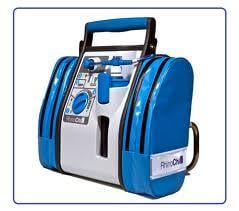
RhinoChill IntraNasal Cooling System
December 3, 2013 – With the benefits of conventional strategies for therapeutic hypothermia following cardiac arrest being called in to question following the publication of two new studies, brain protection specialist BeneChill has restated its conviction that early, targeted brain cooling is the key to improved neurological outcome and survival for the estimated 700,000 people in Europe who annually suffer cardiac arrest.
The TTM (Targeted Temperature Management) trial, presented at the American Heart Association and published simultaneously in the New England Journal of Medicine [1], demonstrated that preventing hyperthermia by maintaining the body temperature of cardiac arrest patients at only slightly lower than normal temperature (36°C) when cooled in hospital was as effective as cooling them to 33°C with regard to survival and improving neurological outcomes.
A second study, also presented at the American Heart Association and published simultaneously in the Journal of the American Medical Association [2], suggested that using 2 liters of 4.0oC Normal Saline to initiate the body cooling process in cardiac arrest patients before their arrival at the hospital did not improve survival or neurological outcomes compared with those patients in whom the cooling process was only initiated once they reached the hospital.
“The results from both these studies are certainly important, but they do not mean that we should abandon the whole concept of out-of-hospital cooling in cardiac arrest patients,” commented Professor Maaret Castren of the Karolinska Institute, Stockholm, Sweden and Chair of the European Resuscitation Council. “The TTM study managed temperature only in hospital with no pre-hospital cooling used, while the Saline Study describes the lack of benefit, as well as the harmful effects caused, when cold saline is used to start the cooling process after the return of spontaneous circulation. The PRINCE study, of which I was lead investigator, suggested that intra-arrest intranasal evaporative brain cooling can improve brain intact survival. Confirmation of this finding is currently being assessed in a larger, enrolling clinical study, PRINCESS, which is powered for outcome benefit.”
RhinoChill is a portable, non-invasive and easy-to-use system for protecting the brain both during and following cardiac arrest. It rapidly and effectively cools the brain through the evaporation of a coolant liquid in the nasopharynx. A randomized, multi-center, European clinical study [3] has demonstrated safety and a clear trend towards efficacy for brain intact survival following Cardiac Arrest. A sub-analysis demonstrated a statistically significant brain intact survival benefit for
the RhinoChill-treated patients receiving CPR within 10 minutes of the arrest, compared with patients who did not receive early RhinoChill cooling (all patients received standard ICU in-hospital cooling).
Clinical investigators are currently enrolling patients into a larger follow-up trial, PRINCESS. This is another randomized, multi-center European clinical study for the very early, intra-arrest, pre-hospital use of RhinoChill in Cardiac Arrest patients. Following an interim analysis by an independent group of European physicians on the first 210 patients, the investigators of PRINCESS have been encouraged to continue patient enrollment.
“Despite the findings of these recent studies, we remain convinced that brain protection, through early, targeted brain cooling, is the key to improved neurological outcome and survival for cardiac arrest patients,” concluded BeneChill CEO Fred Colen. “This is why we have developed the RhinoChill Intra-Nasal Cooling System, which has the ability to rapidly cool the brain of a sudden cardiac arrest victim.”
For more information: www.rhinochill.com
References
1. Nielsen N, Wetterslev J, Cronberg T, et al. Targeted temperature management at 33°C versus 36°C after cardiac arrest. N Engl J Med. 2013
[doi:10.1056/NEJMoa1310519]
2. Kim F, Nichol G, Maynard C, et al. Effect of prehospital induction of mild hypothermia on survival and neurological status among adults with cardiac arrest: A randomized clinical trial. JAMA. 2013
[doi:10.1001/jama.2013.282173]
3. Castren M, Nordberg P, Svensson L et al. Intra-Arrest Transnasal Evaporative Cooling: A Randomized, Prehospital Multicenter Study.
Circulation 2010; 122: 729-736.


 January 05, 2026
January 05, 2026 









